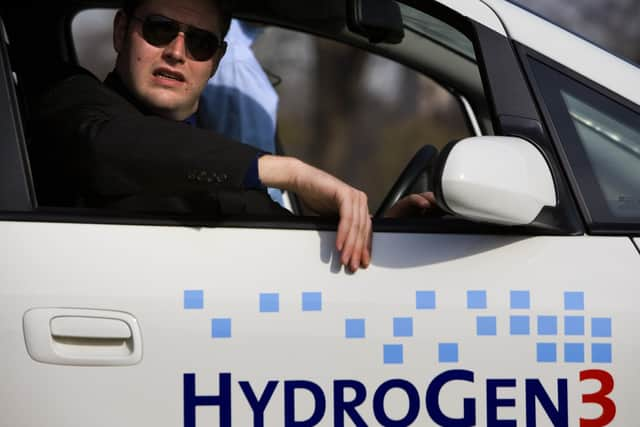Renewable energy: Scotland needs to focus on green electricity, not hydrogen – Dr Richard Dixon
Instead it is an expensive, energy-intensive fuel which should only be used where there really is no alternative.
For years, the fossil fuel industry has been promoting hydrogen as their get-out-of-jail free card to keep on extracting gas. They tell us that gas from the North Sea fields, which is mostly the potent greenhouse gas methane, will be transformed into usable hydrogen, with the inconvenient carbon part of the gas captured and stored back under the North Sea. Apart from the ten per cent or more that will still be directly emitted to the atmosphere of course.
Advertisement
Hide AdAdvertisement
Hide AdThis despite there being no operational carbon-capture-and-storage (CCS) plants anywhere in Europe and four-fifths of those that exist elsewhere using the captured carbon dioxide to push out extra oil… The Scottish Government recently admitted that CCS is not coming here any time before the 2030s.
Even if you believe that the necessary technology will be built, this ‘blue’ hydrogen – made from fossil methane – will be expensive, still involve climate emissions and use lots of energy to make. It’s also hard to get it very pure, which is what the steel and cement industry would need if they were going to use it.
The Friends of the Earth report found that 98 per cent of the world’s current demand for hydrogen is met by fossil fuels, almost none of it with carbon capture.
However, the fraction made from using renewable electricity to split sea-water is increasing. This is green hydrogen and it produces the really pure kind of gas that industry would need. It still uses lots of electricity to make, so again it should be reserved for those jobs which can’t use renewable electricity directly, like some industrial processes which need a gas that burns and maybe some forms of large transport.


That means the hydrogen buses in Aberdeen and bin lorries in Glasgow, the demonstration hydrogen train and the trial of hydrogen for heating and cooking in homes in Fife, are all a dead end, chasing uses for hydrogen where electricity can do the job more efficiently.
Even the seemingly simple plan to mix some hydrogen into the national gas grid comes with danger – a group of US doctors recently highlighted the risk of increased health problems like asthma and dementia, as well the increased risk of explosion.
The Scottish Government has been keen on hydrogen, initially following the oil industry’s story about blue hydrogen but now they have realised that blue hydrogen is clearly a dangerous distraction and they are much more focused on green hydrogen. We have huge potential for green electricity, they reason, so we could produce huge amounts of green hydrogen. They aspire to be Europe’s leading exporter of pure, green hydrogen.
This might be a sensible long-term ambition, but the danger is that it conflicts with the urgent short-term need to use huge amounts of green electricity to electrify transport and heating. Once we’ve moved ourselves off our fossil-fuel dependency, we can decide if making lots of green hydrogen should be the next priority.
Dr Richard Dixon is an environmental campaigner and consultant
Comments
Want to join the conversation? Please or to comment on this article.
